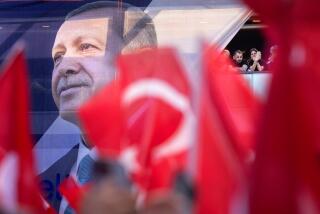MIDEAST : Wooing the New Muslim Republics
- Share via
NICOSIA, Cyprus — The emergence of six Muslim states from the ashes of the Soviet Union has triggered a headlong rush of diplomacy in the Middle East, where Iran, Turkey, Pakistan and the Arab states are reaching for a global balance not weighted toward Washington.
Arab analysts are discounting support from Russia and the other Slavic republics of the old Soviet Union, concluding that they will march west in the years ahead, into the European-American realm already chosen by the independent Baltic countries. But the vision of Kazakhstan, Kyrgyzstan, Tajikistan, Uzbekistan, Turkmenistan and Azerbaijan, with more than 50 million Muslims and now freed from a foreign policy drawn in Moscow, looks like solid ground in a changing world.
The exchange of diplomatic missions is as frantic as a Keystone Kops revival. In the past two months, Turkish officials have trooped to the Muslim states, most of which are Turkic-speaking, and top leaders from the new republics went to Ankara. Turkey moved quickly to grant diplomatic recognition to all the new states and said it will open a consulate in each capital. The Turks are deemed to have a leg up in the race for new relationships in the Muslim belt around the Caspian and Aral seas because of the ethnic connection. With a diversified industrial economy, the Turks are also looking like good trade partners.
But Iran is credited as a powerful religious messenger to a region denied the practice of its faith until the last few years. The Tehran government, ruled by Shiite Muslim clergy, is reportedly flooding the area with made-in-Iran Korans and exploiting its close relations with the Shiite Azerbaijanis, who are separated from their Iranian cousins by an artificial border. Like Turkey, Iran granted blanket recognition to the new republics. The drawback for Iran is the vast Sunni Muslim majority in most of the six states.
Pakistan, which is Sunni and the most populous Muslim state in the region, is also reportedly exploring the potential for relations with the former Soviet republics.
The former Soviets also see a cultural connection but have reservations about committing to Islamic political leagues. Tajik Foreign Minister Lakim Kayumov, discussing the Slavic and Muslim tilts, said earlier this month:
“That is natural. There are peoples that feel closer to certain quarters, like the Islamic world. . . . (But) all the republics of Central Asia have much in common with the European part of Russia, and it would be difficult to separate them.”
While non-Arab Turkey, Iran and Pakistan maneuver for practical position, the Arab states, many uncertain of their geopolitical footing since the end of the Cold War and the rise of U.S. dominance in the Persian Gulf War, are watching the political aspects closely.
Al Ahram, the semi-official Egyptian daily, noted that Kazakhstan had endorsed Palestinian statehood, and the paper declared that the newly independent government there “is sending the Arab and Islamic states a clear signal that this republic . . . will take more interest in the issues that concern that world.” Palestine Liberation Organization Chairman Yasser Arafat visited Alma-Ata, the Kazakh capital, last month.
Another Al Ahram analyst pointed with seeming pride to Kazakhstan’s position within the Commonwealth of Independent States--and the 1,800 nuclear warheads reported on its soil--as evidence that it had “become the first Islamic state, or projected independent Islamic state, to hold nuclear weapons of this quality and in this quantity.”
Meanwhile, the bustling contacts across the former Soviet border continue. According to reports from Cairo, which is asserting its Arab leadership, all six presidents have been invited to attend a Muslim ceremony there. Religious leaders from the republics have visited Saudi Arabia. And Iranian Foreign Ministry officials continue to work the friendly soil of Azerbaijan.
More to Read
Sign up for Essential California
The most important California stories and recommendations in your inbox every morning.
You may occasionally receive promotional content from the Los Angeles Times.










